PhD life, 10 things we learned in our first six months
What advice do our students have after finishing the first 6 months of their PhDs?
At EI, we have an increasing cohort of PhD students who are doing some tremendous work and helping us to add to the breadth and depth of scientific knowledge and understanding. So, what’s it like for someone who has just started their PhD?
We care that PhD students know what to expect before commencing their postgraduate studies, which is why we penned the ever-popular article '10 things you need to know before starting a PhD degree'.
Now that our students have taken that step, we thought we’d catch up with them so that they might share their collective wisdom with others thinking of doing a PhD, too.
They’re a great bunch of people, and they’re working on a fascinating range of topics from single cell sequencing to exploring the gut microbiome using artificial intelligence and machine learning.
They’ve so far, even at this early stage, enjoyed the perks of PhD life - visiting conferences around the world and meeting lots of new people, while also getting to grips with the nitty gritty of science research and exploring the dazzling range of state of the art kit here at EI.
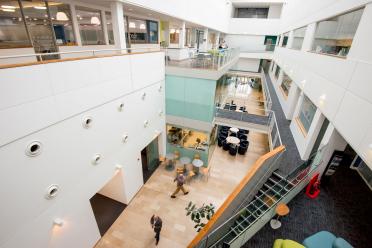
If you're interested in applying for a PhD, applications for our 2021 studentships with Earlham Institute are now open.
This isn’t your undergraduate - there’s no-one telling you what you should be doing and when - it’s up to you to manage your workload and manage it well.
There’s a lot more to a project once you get into the work that isn’t immediately obvious at the beginning - for instance, purchasing, ordering reagents, dependencies on equipment / the time of others. Things aren’t handed to you to get on with now, it is your responsibility to get everything planned, set up, done and then analysed.
There are times that are busier than others, some days are packed, some days are free. So, use those (free, hah!) days wisely (for example, perhaps planning ahead for your thesis or literature review, or reading up on the latest information in your field, or researching awesome PIPS placements, or scouting out potential locations for your postdoc, or helping out your science communications team with some public engagement).
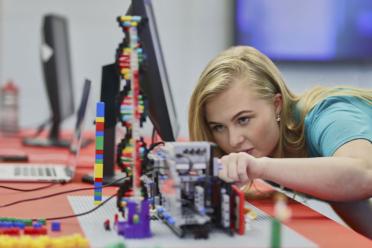

Things aren’t handed to you to get on with now, it is your responsibility to get everything planned, set up, done and then analysed.

Having said all of that in point number 1, your supervisors and other PIs and team members around you are there to guide you in your first initial months. It’s a learning curve to learn to be independent whilst also fulfilling the lab group’s needs.
One thing we didn’t expect at the start was the importance of collaboration: how whilst you have to be independent you rely heavily on other’s ideas and their hands-on experience with machinery and techniques.
There are plenty of opportunities to develop whatever skills or area of science you want. If you come with a background in biology, you will be given the opportunity to learn computer science and vice versa.
Take the opportunity whilst you are in the development stage of your career to learn as much as you can - lots of training courses are available to early career researchers at a very reasonable (often free or much reduced) price.
Check out the training events at EI, for example, where you can immerse yourself in the basics of Python or de novo sequencing.
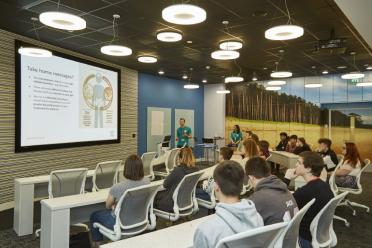
Although a PhD is more on the work side of the spectrum (and you should treat it as such if you want to succeed), it does also offer more flexibility than a standard ‘9-5’.
Of course, you might end up working very strange hours whilst staring down a microscope at algae and get frightened by a stray crab wandering around in the shadows when everyone else has gone home, but it’s all worth it in the end.
You hear many stories about PhD students who are increasingly, it seems, suffering from mental health issues or struggling with the excessive demands of their project.
At EI, there is an emphasis on maintaining a work-life balance. Working effectively, using time productively, is always more beneficial in the long run than working yourself into the ground.

Of course, you might end up working very strange hours whilst staring down a microscope at algae and get frightened by a stray crab wandering around in the shadows when everyone else has gone home, but it’s all worth it in the end.

Very few days go exactly to plan, so no day is boring or repetitive (other than maybe setting up some experiments in the lab or wrangling data from databases, which can be extremely monotonous, it’s a fact of science life).
(On that note, remember to log everything you do - and in a way that you can go back to at any point and understand clearly - because sooner or later you know you’ll have to write it all up!)
It should be said, one of the best bits, after weeks of hard work and things not going to plan, when something finally works and you begin to get results it is one of the most rewarding feelings!
You have to prioritise – there is no way you will get everything on your ‘to do’ list done. And it's about remembering that this is not a negative.
What’s urgent, what’s not? Can I do this in five minutes? Should I be on twitter right now, really? Should I even be reading this article? (Yes, it’s very important, carry on reading).
Don’t compare yourself to other PhD students and don’t compare projects. We are all at different points and researching vastly different things. Some people’s experiments will be done very quickly and they might have results before you but that doesn’t mean you are behind. Each project 'progresses' at a different pace.
Although, if your project does happen to be progressing at a nice rate, don’t rest on your laurels!
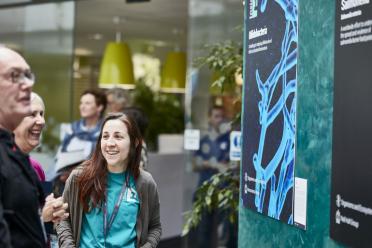

Don’t compare yourself to other PhD students and don’t compare projects. We are all at different points and researching vastly different things.

In any research Institute, it can be daunting sometimes to be around and have present your research to world-leading academics. But it is worth remembering that they have all been where you are now before as well.
And that they really don’t expect you to know everything in your first six months.
A good working relationship with your supervisor is vital – here at EI, we are fortunate to have supportive and dedicated Group leaders. This is helped by also having a vibrant workforce who are all understanding and remember what it was like starting their PhDs, therefore, they are always on hand to help; whether they be in your research group or not!
Although your supervisor is your line manager, you are given more freedom to shape your project than you might expect. Different supervisors have different systems and project management methods, and it is about learning how they operate early on, such that you can be as productive as possible with your time.
We are spoiled here at EI, having access to such brilliant facilities - far better than we were expecting whether that be laboratory based or computational - a modern and friendly working environment, and free coffee, what more could we ask for?!
The facilities are state of the art everything. The building is modern and well fitted. And the culture matches this. There is pretty much always someone who is an expert on a topic you have a question on that you can approach for guidance.
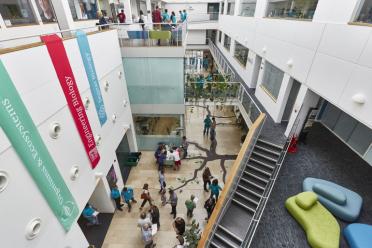

We are spoiled here at EI having access to such brilliant facilities - far better than we were expecting whether that be laboratory based or computational - a modern and friendly working environment, and free coffee, what more could we ask for?!

Thanks to Anita Scoones, Matthew Madgwick, Martina Poletti, Peter Osborne, Josh Colmer & Sam Witham for taking the time to talk to us and to share their collective pearls.
One of the hardest bits of doing a PhD?
One of the best bits?
Our students are all supported as part of a Doctoral Training Programme on the Norwich Research Park by the UKRI BBSRC.